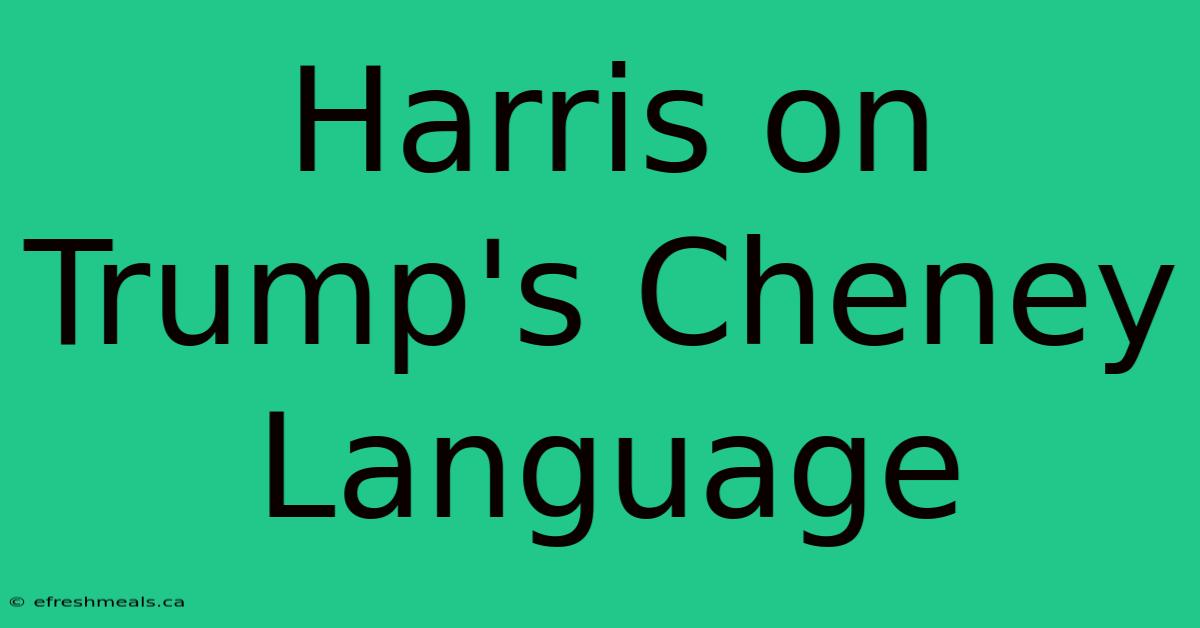Harris On Trump's Cheney Language

Discover more detailed and exciting information on our website. Click the link below to start your adventure: Visit Best Website nimila.me. Don't miss out!
Table of Contents
Harris on Trump's Cheney Language: A Dangerous Escalation?
Editor's Note: Vice President Kamala Harris recently addressed former President Donald Trump's rhetoric regarding Liz Cheney, raising concerns about its implications for the future of American democracy. This article delves into the context of the situation and its potential impact.
Why It Matters: Trump's repeated attacks on Cheney, a vocal critic of his actions surrounding the January 6th Capitol riot, have been met with a mix of condemnation and concern. This has sparked discussions about the nature of political discourse, the influence of rhetoric on public opinion, and the potential for political violence.
Key Takeaways of Trump's Rhetoric:
| Takeaway | Description |
|---|---|
| Personalization of Politics | Trump's rhetoric often focuses on individual politicians rather than policy, using derogatory language to demonize opponents. |
| Appeal to Emotion | His speeches employ highly charged emotional appeals, often fueled by fear and anger. |
| Normalization of Violence | Trump's language has been criticized for potentially contributing to an atmosphere where violence is seen as a legitimate means of political engagement. |
Harris on Trump's Rhetoric
Vice President Harris has directly addressed Trump's language regarding Cheney, condemning his actions and warning of their potential consequences. Her statement highlights the dangers of using inflammatory rhetoric in a political context.
Trump's Use of the Term "Cheney"
Introduction: Trump's consistent use of the word "Cheney" as a pejorative term, often paired with insults and accusations, has been a recurring theme in his public pronouncements. This tactic signifies a broader trend in his political strategy.
Facets of Trump's Language:
- Personalization: Trump frequently refers to Cheney as "Liz" or "the Cheney's," aiming to evoke a sense of personal animosity and dismissiveness.
- Disparagement: He regularly uses phrases like "RINO" (Republican in name only), "weak," and "disloyal," characterizing Cheney as an enemy within the Republican Party.
- Association with Violence: Trump has previously employed the word "Cheney" in contexts referencing violence or threat, associating it with a sense of danger.
Summary: Trump's use of the term "Cheney" goes beyond mere political disagreement. It aims to cultivate a hostile environment, demonize his opponents, and undermine their credibility.
The Implications of Trump's Rhetoric
Introduction: Trump's use of inflammatory language has far-reaching implications for the political landscape, impacting public discourse and potentially influencing political violence.
Further Analysis:
- Erosion of Civility: His rhetoric normalizes aggressive and divisive language, contributing to a decline in respectful political dialogue.
- Polarization of Opinion: Trump's language reinforces partisan divides and fosters hostility between opposing groups.
- Incitement of Violence: While not explicitly calling for violence, his rhetoric can create an atmosphere where violence is seen as acceptable.
Closing: Trump's language, while seemingly focused on Cheney, represents a wider pattern of political discourse that is detrimental to democratic values and the peaceful exchange of ideas.
FAQ
Q1: What are the risks of using such language in politics? A1: It can lead to political violence, hinder constructive dialogue, and further divide society.
Q2: Is this a new trend in politics? A2: While not entirely new, this style of political rhetoric has become increasingly prevalent in recent years, fueled by social media and the rise of populism.
Q3: How can we mitigate these risks? A3: Promoting media literacy, encouraging civil discourse, and holding public figures accountable for their words are all crucial steps.
Tips for Civility in Political Discourse
Introduction: Here are some tips for engaging in political discussions in a respectful and constructive manner.
Tips:
- Focus on Facts: Base your arguments on evidence and avoid spreading misinformation.
- Listen Respectfully: Give others a chance to express their viewpoints without interrupting.
- Avoid Personal Attacks: Engage with ideas, not individuals.
- Use Inclusive Language: Emphasize shared values and common ground.
- Seek Common Ground: Identify areas of agreement to build bridges instead of further division.
Summary: Cultivating a civil and respectful approach to political discourse is essential for the health of democracy and the peaceful resolution of disagreements.
Summary of Harris on Trump's Cheney Language
Vice President Harris's statement regarding Trump's rhetoric highlights the dangers of using inflammatory language in a political context. While this article focuses on Trump's attacks on Liz Cheney, the underlying issues extend to a broader trend of political discourse that relies on divisive language and personal attacks.
Closing Message: In a democratic society, the peaceful exchange of ideas is paramount. While disagreements are inevitable, the use of divisive and inflammatory language is a threat to the very fabric of democracy. It is crucial to remember that words have power, and we must all strive to promote respectful and constructive dialogue.

Thank you for visiting our website wich cover about Harris On Trump's Cheney Language . We hope the information provided has been useful to you. Feel free to contact us if you have any questions or need further assistance. See you next time and dont miss to bookmark.
Featured Posts
-
Derrick Lewis Withdraws From Ufc Edmonton
Nov 02, 2024
-
Orlando Mayor 2 Killed Several Hurt In Halloween Shooting
Nov 02, 2024
-
Daylight Saving And Baby Sleep What To Expect
Nov 02, 2024
-
Grocer Helps Latinos Celebrate Dia De Los Muertos
Nov 02, 2024
-
Lopezs Our Pain Endorsement For Harris
Nov 02, 2024
